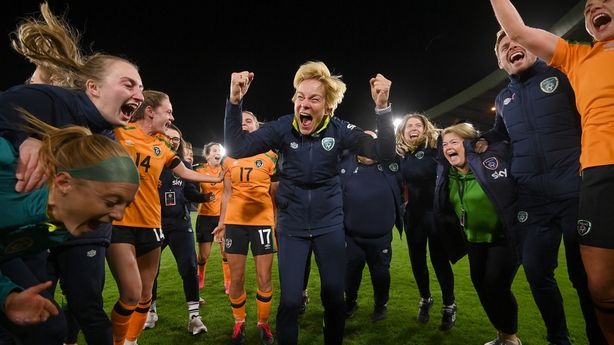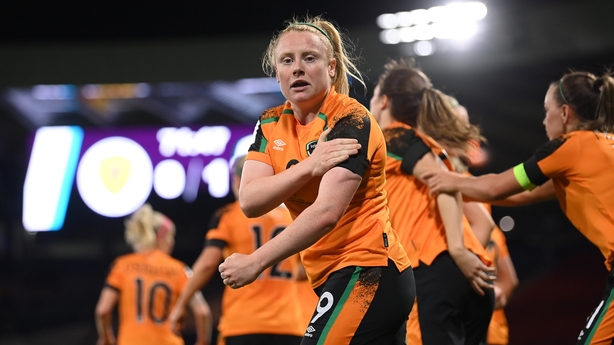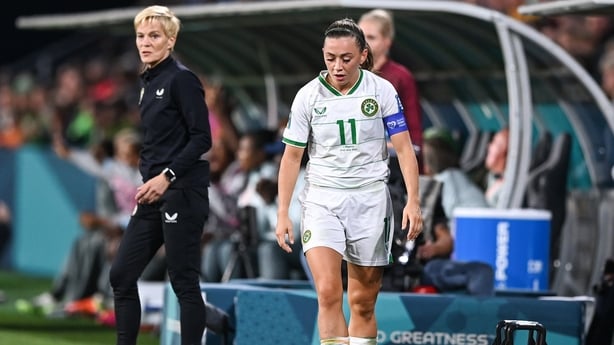It wasn't quite a case of 'Vera who’? when the Republic of Ireland manager took charge of the team back in September 2019 but she was far from the household name she now is around the country.
Handed the reins after Colin Bell was unable to lead the team to the 2019 World Cup, Pauw is by some distance the most successful manager that the women’s national team has had but now leaves on a disappointing note, with just a draw to show for their efforts in Australia.
As a player Pauw, represented her native Netherlands 89 times over a 14-year career but the Dutch were unable to qualify for a major tournament during that time.
A trailblazer at club level, she became the first female Dutch player to ply her trade professionally when she signed for Serie A club Modena in 1988, spending two seasons in Italy before returning to play in the Netherlands.
Pauw combined the final few years of her playing career with her coaching badges and was fully qualified as a manager when she and her husband, Dutch coach Bert van Lingen, moved to Scotland to work with Rangers.
Pauw was appointed coach and technical director of the Scottish women’s team at the same time and spent six years there before eventually leaving to take up a similar role with the Netherlands where she enjoyed success, leading the Dutch to the semi-finals of the 2009 World Cup.
However, she parted company with the Netherlands six months later, claiming that she and the KNVB had ‘grown apart’ and later cited a sense of indifference to the women’s team and their achievements as the driving force for her exit.
Spells in charge of the Russian and South African national teams followed before Pauw returned to club soccer, joining the Houston Dash in the US National Women's Soccer League.

Pauw was relatively successful in Houston, setting a record for wins and goals scored in a season, and while they were unable to make the play-offs, the manager was warmly praised by the club and their president Chris Canetti when they parted amicably in 2018.
However early this year Pauw was named amongst several managers and coaches in a report by the NWSL that discovered widespread, ongoing misconduct in the league.
The report claimed Pauw attempted to "exert excessive control" over her players' "eating habits" and that it was not in "best practice".
The manager has robustly defended herself and claimed that there is an individual actively trying to "destroy" her career, and the timing of the report and the allegations certainly didn’t help Ireland’s World Cup preparations.
World Cup qualification with Ireland is perhaps the high point in Pauw’s managerial career to this point, and she has certainly helped to improve the standard of the national team.
Taking charge of the Girls in Green in 2019, Pauw’s side narrowly missed out on clinching a play-off spot for the 2022 European Championships.
Pauw helped to develop a young, promising side, making big strides during that campaign. Placed in a tough group with Germany and Ukraine, Ireland were at one stage in pole position to secure the play-off until slipping up against Ukraine.
However while that campaign ultimately ended with Ireland finishing in third place and missing out of the tournament, huge progress was made on and off the pitch.
Under Pauw, Ireland move towards professionalism took huge strides and the team really began to connect with the Irish public, particularly in Tallaght Stadium where they played in front of ever-increasing crowds and forged a genuine relationship with their supporters.
A two-year contract extension for Pauw and her management team followed as the FAI put their faith in the manager and her ability to help Ireland qualify for the 2023 World Cup. That faith proved to be well placed.
Opening their qualifying campaign with a 1-0 defeat to the World number 2 ranked side Sweden wasn’t perhaps the dream start for Ireland, but the manner of the defeat and their performance pointed to progress.
Taking seven points from their next three games, including an 11-0 hammering of Georgia meant that Pauw’s side were in good shape going in their away clash with the Swedes and they put on a great performance, coming away with a 1-1 draw and feeling hard-done by.
Further victories over Georgia and Finland left Ireland needing just a win over Slovakia to progress to the play-offs and Denise O'Sullivan’s first-half goal gave them a 1-0 win and set-up that crucial play-off with Scotland for a World Cup place.
Amber Barrett’s 72nd-minute goal proved to be enough for Ireland on an emotional, historic night at Hampden Park as Pauw’s side held their nerve to claim victory.

Ireland’s display was a typical Pauw performance on the night with a safety-first approach seeing the Girls in Green keep in tight at the back and defending stoutly until Barrett arrived off the bench in the closing stages to steer them into history.
Pauw was widely praised for her swift and decisive response once footage of her players singing a version of 'Celtic Symphony' in the dressingroom after the game came to light.
Her tactical set-up of defence first continued into Ireland’s World Cup preparation as Pauw looked to test her side against some of the best in the world. Narrow defeats, but defeats nonetheless, followed against the USA and France as Ireland built towards the World Cup.
A 3-2 victory over Zambia in June was the line in the sand for Ireland’s World Cup squad selection and Pauw raised some eyebrows as stalwarts like Jamie Finn, Aoife Mannion, Megan Campbell and Leanne Kiernan all missed out.
The squad selection, particularly Finn’s absence led to some mumblings of discontent and questioning of the manager’s decisions, particularly from former Ireland players and at the same time, the fallout from the NWSL report and criticism of Pauw began to overshadow Ireland’s World Cup preparations.
The first sign that things may not be well within the camp came just before the start of the tournament when an article from The Athletic about Pauw’s time in charge of the Houston Dash was published and captain Katie McCabe admitted that it was causing a distraction.
McCabe was less that fulsome in her support of Pauw when pressed, referencing her clashes with the manager and she appeared to qualify her backing of her boss.
"I can’t answer for each and every player," McCabe said when asked of her support for Pauw. "Of course Vera has a style of management that we’ve used to over the last few years. It’s something we’ve worked together, we’ve argued with each other of course, you’re never going to get on 100% with your manager at times."
Ireland's campaign in Australia never really ignited. A narrow defeat to the hosts was followed up by a 2-1 reversal to Canada and, with progress from the group no longer possible, a scoreless draw with Nigeria.
Pauw’s tactics and approach came under scrutiny once more with questions raised about Ireland’s negative approach and the manager’s substitutions, but most damning of all was the spat between the manager and McCabe as tensions simmered between the two during Ireland’s draw with Nigeria.

McCabe urged Pauw to bring on fresh legs as Ireland faded and in the aftermath of the post-match press conference in which the manager defended her decisions, McCabe made a social media post comprising of an emoji noted for staying silent when wanting to say something.
For her part, Pauw was critical of McCabe’s efforts to run the game from the pitch. "If Katie McCabe wants a change, it doesn't mean… she's not the coach. Everybody was doing so well. So I said 'what do you want Katie, taking the best player off?' No."
Reports prior to the World Cup had claimed that Pauw and the FAI were close to agreeing a new contract that would see the manager look to take the team to the 2025 European Championship but no such deal ever materialised, despite Pauw’s admission that she was eager to stay.
A campaign that promised much but never sparked into life certainly played a major part in the FAI’s decision to part company with their manager, but it seems that the distractions from outside of the squad, along with internal unrest are the real driving forces.
The FAI’s decision to now cut ties with the manager who helped to revolutionise women’s soccer in the country is brave and only time will tell if it’s the correct one.


